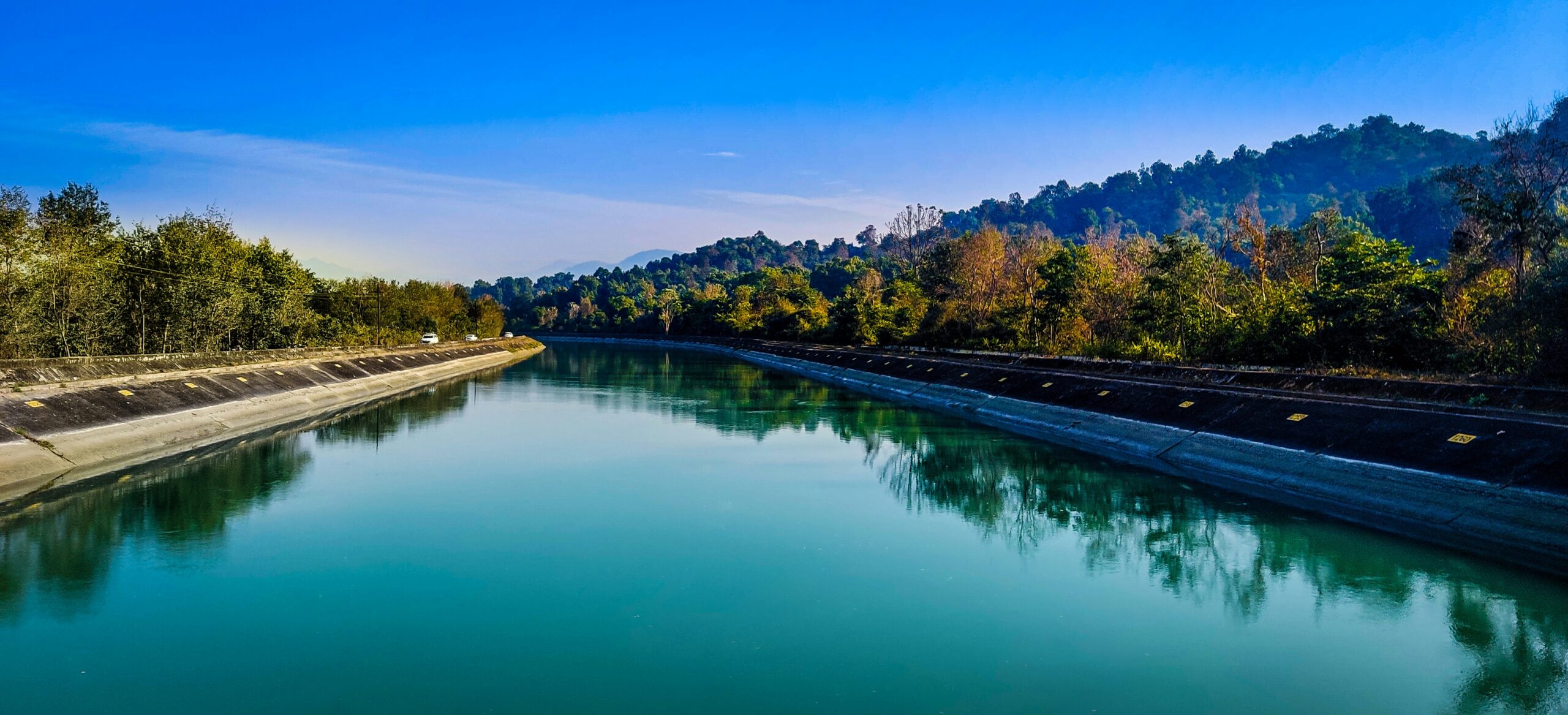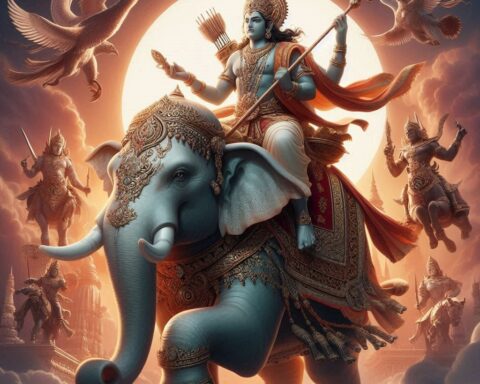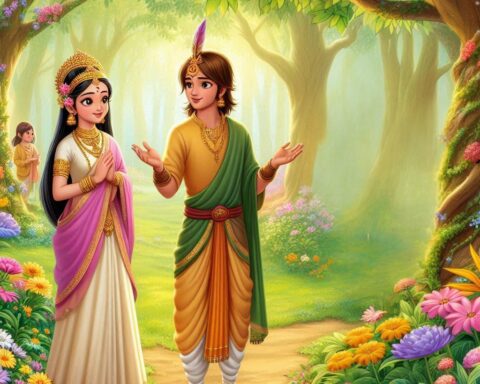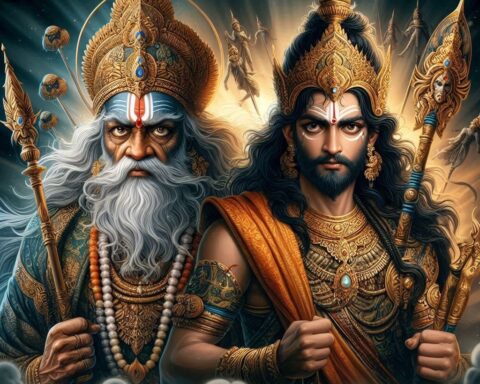Ganga looked down on earth from her heavenly abode and, as usual, was delighted by the sights; verdant valleys, majestic snow-capped mountains, lush green fields, gently-falling, and sometimes, torrential rains, delicate dewdrops on flowers and leaves, and most of all, the joyous inhabitants, the handsome, beautiful human beings going about their lives, happy and carefree, living harmoniously with numerous other life forms.
Ganga enjoyed watching men, women and children as they went about their daily tasks taking everything in their stride; laughing when happy, crying when sad, reacting impetuously, and even imprudently, in anger and frustration, relishing every moment of their lives despite knowing death was imminent.
Ganga wondered at the dichotomous magic of the human world. How could they live so freely knowing they are all going to die one day or the other, despite all the bondages that they are so tightly gripped in?
She was fascinated by the idea of human beings being born and reborn numerous times, deeply struck by their ability to start life anew every few years. Each birth seemed to give them an opportunity to overcome their past problems and become better people than before. The best part was forgetting everything about their previous births, freeing them from the burdens of their past. She thought to herself, “Maybe what kept them happy was knowing and accepting that nothing was in their control, allowing them to embrace life as it comes.”
Ganga saw little streams forming watery ridges and burrows as they trickled through the soil, sprouting life where there was potential. She imagined herself gushing through the fertile plains, empowering new life. She imagined the joy she would feel when the beautiful brown soil intermingled with her waters to form unending green fields, vast orchards, wild forests, and meadows in which sounds and conversations of earthlings would echo unceasingly.
Ganga looked down yearningly at Earth. She wished she could go and live among the people there. She wished she could embrace the miracles of human love, sorrows, and all their experiences. She wished she could do something for the people on earth.
She spoke to her father, Lord Brahma about her desires. Smiling at her enthusiasm, he said, “The people of earth will call you when they need you. Until then, wait patiently, and find out who can help control your surge downwards. If left uncontrolled, your powerful currents can be catastrophic for delicate Mother Earth and her people.”
And so, she waited for when her desires and the needs of the people would resonate in tandem and she would find a place there for herself.
*********************************************
King Sagara was an illustrious ruler of the Suryavanshi dynasty. At the peak of his power, he conducted the Ashwamedha, or horse sacrifice, a ritual that not only demonstrated his might and power to the world but also allowed him to annex smaller kingdoms without bloodshed.
The horse had escaped from the ritual and galloped away into the wilderness. King Sagara ordered his 60,000 sons to find and bring back the animal without which the yagna would remain incomplete.
After searching everywhere, King Sagara’s sons finally found the horse underground, in Sage Kapila’s ashram. They saw the sage deep in meditation while the horse stood calmly next to him. The arrogant, presumptuous royal princes assumed the sage was the thief and decided to teach him a lesson.
Sage Kapila was in the midst of an intense levitating meditation session. The sons of Sagara lit some dry grass on the meditation seat. When the sage felt the burning flames, he opened his eyes and wordlessly looked at the men in front of him, still hanging in mid-air. They were instantly burned to ashes!
Sage Kapila simply returned to his meditative stance, the flames beneath him automatically extinguished.
In the meantime, King Sagara worried about his sons. The priests were getting restless too as they couldn’t take the ritual forward without the sacrificial horse. The king sent his grandson, Anshuman, in search of his uncles. The spritely lad followed their path and soon reached Sage Kapila’s ashram.
He was aghast to see big piles of ashes strewn all over the place. The horse was grazing peacefully close by. The sage’s face exuded a strange, calm light. Anshuman recognized him to be an enlightened soul. Although he was deeply troubled and sensed that some disaster had struck his uncles, the royal prince waited patiently for the sage to finish his meditation.
When Sage Kapila opened his eyes, he saw the angst-ridden face of young Anshuam staring at him reverently.
“Oh, wise sage! Can you please tell me what happened to my uncles?”
“They paid for their ignorance and arrogance with their lives.” Pointing to the piles of ashes, he continued, “There they lie, poor unredeemed souls!”
Anshuman was shocked and saddened to hear about the tragedy. But he knew and accepted that nothing could be done now. He prostrated before the sage and pleaded with him. “Please help them find their place in heaven. I beg for mercy on their behalf.”
Sage Kapila smiled gently at Anshuman, “Don’t grieve for your uncles. Their death has triggered an event that will change the course of the history of this land. You and your family have a big task to accomplish by way of releasing your uncles’ souls. Bring Ganga from the heavens to flow on earth. When her sacred waters touch these ashes, their souls will be redeemed. Ganga’s waters will not only rejuvenate Mother Earth and fill her with new life but will also be a source of moral and spiritual strength for the people of this land for aeons to come.”
Anshuman returned home with the horse, sad but enthused. The sacrifice was completed, and King Sagara handed over the kingdom to Anshuman and went into the forest to meditate to appease Ganga. Before he left, he made the grandson promise that should he fail, Anshuman and the future generations would continue the effort to bring down the holy river.
King Sagara died before he could complete his mission. It was Anshuman’s turn to try. He handed over his kingdom to his son, Dilipa, and entered the forest to do intense tapas. He too died without accomplishing the onerous task.
Dilipa also couldn’t reach out to Ganga. His sorrow at the failure of three generations of the Suryavanshis was so deep that he couldn’t die in peace. His soul writhed in agony in his old, haggard body refusing to let go of it. Seeing his father’s pitiful struggle, Bhagirath promised him that he would not ascend the throne until Ganga came down and redeemed his ancestors’ souls. Only then did the tortured soul of Dilipa leave his withered body and he died in peace.
Bhagirath handed over the administration of the kingdom to his ministers and went into the forest. His relentless tapas along with the accumulated efforts of three generations of the Suryavanshi forefathers finally bore fruit and matched Ganga’s desires. The time had come!
She appeared to her supplicant and said, “I am ready to descend to earth. However, you have one more task to do before that. The only one who can stem my ferocious flow is Lord Shiva. Pray to Him and seek His help.”
For the next several years, Bhagirath spent meditating on Lord Shiva who finally appeared to him. “Go ahead, my dear child. Ask Ganga to come down, and I will curtail her ferocity. Mother Earth will get access to her pure, sacred water but will not be ravaged by her demonic strength.”
Thanking the Lord for His benevolence, Bhagirath again approached Ganga, and she delightfully descended. Her turbulence was tremendous, even more so because she couldn’t control her delight at finally getting her desire. The people of the earth trembled with fear at her speed and power. But Lord Shiva caught and imprisoned her in His locks of hair, confining her gargantuan surge to a humanly tolerable trickle.
As Ganga flowed down to earth, she delighted in nature’s beauty and bounty as much as the people of Earth welcomed her joyfully and warmly everywhere she went. She swished gaily through valleys, mountains, plains, and meadows, and her joy knew no bounds. Unable to control her unbridled happiness, Ganga flooded Sage Jahnu’s ashram and destroyed it.
Livid at her rashness, Sage Jahnu swallowed Ganga and she lay imprisoned in the rishi’s stomach. Bhagirath appealed to the sage respectfully and in all humility, explaining the generations of efforts that had gone into bringing Ganga to earth and her purpose for being here. Sage Jahnu let go of his anger and released Ganga. She sprang out from his right ear, thus earning herself another name, Jahnavi, the daughter of Jahnu.
After this incident, Ganga timidly followed Bhagirath until they reached the place where the ashes of King Sagara’s sons lay waiting for redemption. The instant her sacred waters touched the ashes, they were raised to their heavenly abodes.
And thus, Ganga became Bhagirathi, skipping merrily at some places, frolicking joyfully at other places, gushing angrily at still other places, wreaking havoc, sometimes to wake people from their lethargy, and sometimes, to curtail human greed, meandering gently at times, helping people cleanse themselves of their sins at other places, and doing everything in her power to help Mother Earth and her people.
She had fallen in love with human beings as she watched them from her heavenly home. At close quarters, she loved them even more. She watched them struggle through their lives trying their best to find happiness and contentment. She embraced them joyfully as they took a dip in her holy waters. She tried her best to make them happy.
She thought to herself, “I don’t think I will ever want to leave this place. I will continue to watch in fascination as people take birth, die, and be born again. The delight I experience when I see the awe-filled faces of people when they behold my power, strength, and vitality will never cease.”
“I will continue to welcome people who visit me regularly hoping to get rid of their sins even if they do so only to commit new ones. Yes, some of them are greedy, and yet I love them. I will never tire of being surprised watching people return to my banks through multiple births wishing for the same insane thing, that my waters wash off their karmic effects, and that their souls be liberated automatically.”
“I wish I could tell such people that I can withstand all the sins of humanity. But their karmic cycle can end only through their piety and morality. I will not give up hope and will never sway from helping human beings see through the illusionary Maya so that they may discover the ultimate truth which is the very purpose of their births.”
Photo by Raj Dhiman on Unsplash






